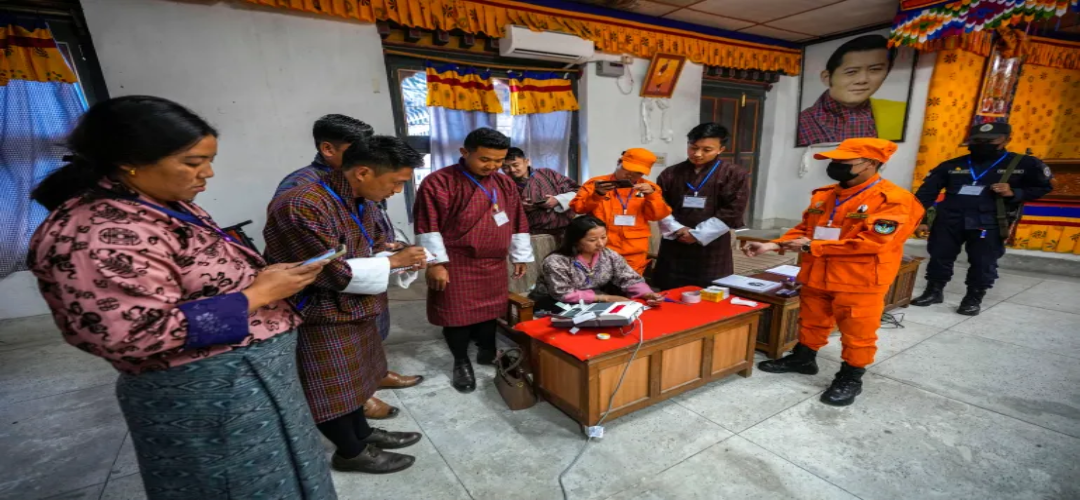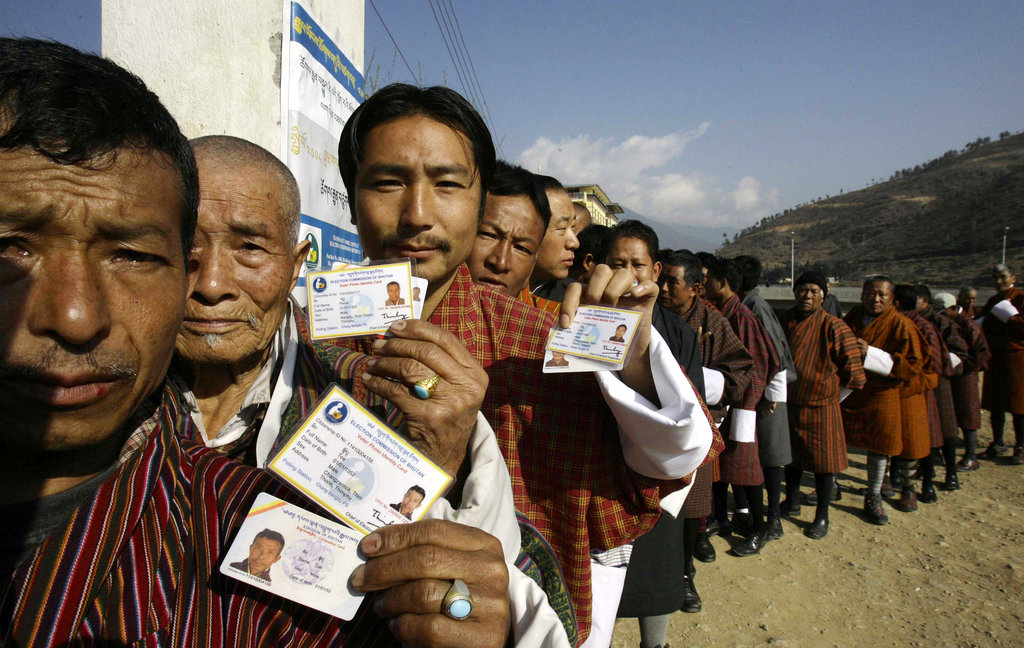Heralding a New Chapter
January 13, 2024 | Expert Insights

The People’s Democratic Party (PDP), led by former prime minister Tshering Tobgay, won 30 of the 47 seats in Bhutan’s parliament, thus sealing its right over the formation of a government. The rival contender, the Bhutan Tendrel Party (BTP) won the remaining 17 seats.
The pandemic has precipitated economic challenges for this seemingly serene country. The election was overshadowed by economic concerns that have exposed the inadequacy of Bhutan’s focus on Gross National Happiness (GNH) to measure its national well-being.
Background
Landlocked in the Eastern Himalayas between China and India, Bhutan has a sparse population of around 800,000. It was a kingdom with an absolute monarchy for many years before it converted to a constitutional monarchy soon after the present king's reign began. It has held four parliamentary elections since 2008.
While both contending parties remained committed to the constitutionally enshrined emphasis on GNH, they highlighted more tangible economic issues also in their campaigns. Three other parties were eliminated in a round of voting in November.
The incumbent Druk Nyamrup Tshogpa (DNT) party had presided during a challenging period with the COVID-19 pandemic, which took a severe toll on business, particularly tourism. Bhutan’s external debt service ratio (the ratio of its external debt obligations to its export earnings) increased from 5.8 per cent in 2019-20 to 15.1 per cent in 2022-23.

Analysis
Bhutan's youth unemployment rate stands at about 29 per cent. Although its economy shrank by 10 per cent in 2020, it has recovered, growing at almost 4.5 per cent since then. Yet, the mountainous country struggles to offer its youth adequate opportunities for education and employment or sufficiently remunerative jobs, resulting in an "exodus" of young people, particularly to Australia. Around 15,000 Bhutanese were given Australian visas in 12 months leading up to July 2022, which is more than the combined number over the preceding six years and amounts to nearly 2 per cent of Bhutan's population. The emigration also includes experienced people in the civil service and private sector. It has been referred to as a "brain drain", undermining Bhutan's economic potential in addition to concerns that the kingdom's villages will become deserted.
Tourism, a key component of Bhutan's services industry and contributor to its foreign currency is still getting back on its feet after the pandemic. Foreign tourists in 2023 were three times less than 2019 before the pandemic.
Understandably, economic issues were high on Bhutanese voters' priority list. The winning PDP's party manifesto cited government data that one in every eight people in the country struggled to meet basic requirements like food.
The PDP (like the BTP) has pledged to increase investment in hydropower. Geographically supported by Bhutan’s mountain valleys and plentiful water resources, hydropower is Bhutan’s primary energy source and a significant contributor to its economy. India would be a very willing consumer, so would be energy-starved Bangladesh across the Siliguri Corridor.
The PDP has also promised to develop support industries like steel and cement to boost employment. Tobgay, prime minister from 2013 to 2018, has vowed to attract more foreign investment to reinvigorate the economy and revive tourism. Yet, his party has stated its commitment to continuing the GNH.
Focusing on factors like psychological well-being and cultural diversity, the GNH will continue as a constitutional policy instated by an earlier king; the monarchy continues to enjoy popular support and political reverence in Bhutan.
In December, Bhutan’s king announced plans to build a megacity in Gelephu, a town at the border with India, more specifically Assam, to have zero-carbon industries supported by foreign investment. The PDP has voiced its support for this Special Economic Zone (SEZ) which India initiated under the previous government as a project to generate jobs. In this way, the monarchy's influence in Bhutan provides some measure of continuity in policy, ensuring that projects get implemented across governments and reduces the degree of differences between rival parties.
The PDP is widely considered India-friendly; Mr Tobgay is known to have good relations with India, where he completed his high school (The Telegraph, January 11, 2024). Given Bhutan’s economic reliance on India, the new government will no doubt prioritise maintaining ties with New Delhi, which have been historically strong.
On the other hand, it will also have to cooperate with China on the border talks process to resolve longstanding boundary disputes, even while China pressures it by building settlements on its territory. The PDP government will have to tread carefully given that this has triggered security concerns in India in the backdrop of the 2017 Doklam crisis, where Chinese troops occupied Bhutanese territory bordering India, posing a threat to the strategically sensitive Siliguri Corridor or “Chicken’s Neck” connecting Northeast India to the rest of India.
Assessment
- Notwithstanding the ecological benefits of GNH, Bhutan has to make the nation self-sufficient in real economic terms. For this, a more realistic economic policy tempered by a mature polity is the need of the time.
- The new PDP government will have economic reform on its agenda, and it remains to be seen whether it will progress on its promises. India could play an important role in Bhutan's economic recovery through joint projects like the SEZ, Indian investment in Bhutan (such as in zero-carbon industries) and hydropower purchase or allowing its transmission to Bangladesh through the Indian grid.
- As a "small, underdeveloped country doing [its] best to survive," Bhutan will have to navigate the diplomatic balance between its two neighbours, China and India, both regional heavyweights, particularly in light of Chinese encroachments on its territory and India's security concerns about its Himalayan borders. The recent news of Beijing trying to strike a separate border deal with Thimpu would have concerned New Delhi.








Comments